Tenses with Definite Time Adverbs. Fill in the blanks with the correct time adverbs. Select your answers from the choices provided in the brackets.
Category: Adverb
Adverbs Quiz
Adverbs Quiz – Enhance your grammar skills with this fun and interactive Adverbs Quiz! Test your knowledge of different types of adverbs with 30 fill-in-the-blank questions. Perfect for learners of all levels!
Adverbs Word Order Exercises
Improve your English grammar skills with our comprehensive Adverbs Word Order Exercises! Learn how to place adverbs correctly in sentences through examples, rules, and practice questions. Perfect for learners at all levels!

Adverbs of Time Exercise
Boost your English grammar skills with our comprehensive Adverbs of Time Exercise. Practice with examples and answers to master adverbs like “now,” “soon,” and “yesterday.” Perfect for learners of all levels!

Adverbs: Definition, Types, Usage and Examples
Adverbs: Definition, Types, Usage and Examples. Learn what they are, their types and how to use adverbs in sentences by reading through the article and the examples given. Also, try out the practice questions to check your understanding.

Conjunctive Adverbs
Ditch the clunky transitions! 💪 Conjunctive adverbs are your shortcut to clear, impactful writing. 🏆

Comparison of Adverbs
Learn how to use comparative and superlative adverbs like a pro, with clear examples and handy tips.

100 Most Common Adverbs in English
Most Common Adverbs in English: Master the English language with this list of the 100 most common adverbs. Adverbs are used to modify verbs, adjectives, and other adverbs, and they can be a valuable tool for improving your English writing skills.
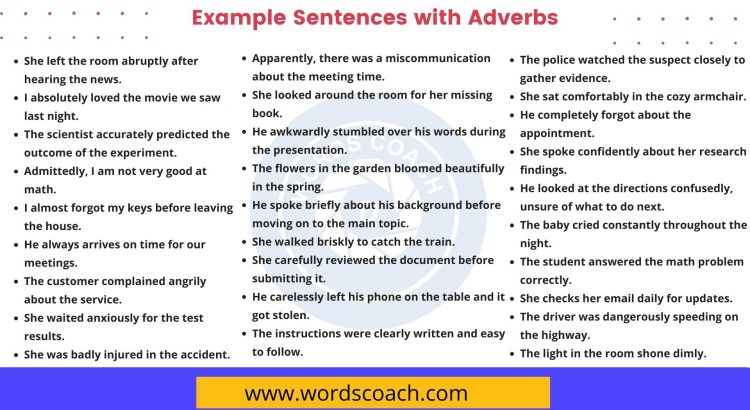
20 Examples of Adverbs, Example Sentences with Adverbs
An adverb is a part of speech that modifies or describes verbs, adjectives, and other adverbs. It adds more information to a sentence, telling how, when, where, how often, and to what extent something happens.

10 Examples of Adverbs, Example Sentences with Adverbs
10 Examples of Adverbs, Example Sentences with Adverbs

50+ Examples of Adverbs, Example Sentences with Adverbs
An adverb is a part of speech that modifies or describes verbs, adjectives, and other adverbs. It adds more information to a sentence, telling how, when, where, how often, and to what extent something happens.

100+ Examples of Adverbs, Example Sentences with Adverbs
An adverb is a part of speech that modifies or describes verbs, adjectives, and other adverbs. It adds more information to a sentence, telling how, when, where, how often, and to what extent something happens. Adverbs can make a sentence more interesting and descriptive, and can help to clarify the meaning of the sentence.
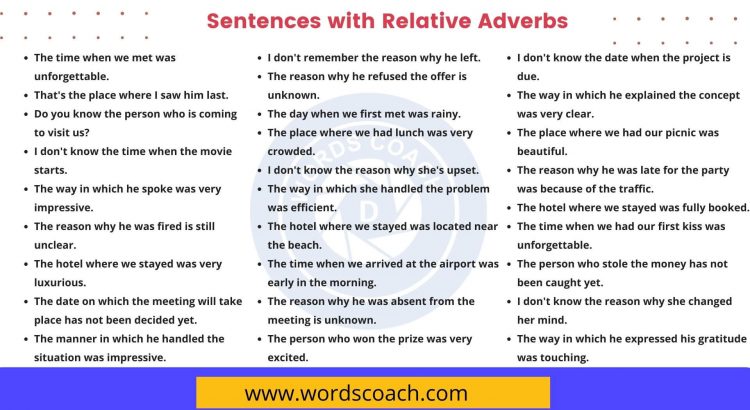
100+ Sentences with Relative Adverbs in English
Here are 100+ sentences with Relative Adverbs:
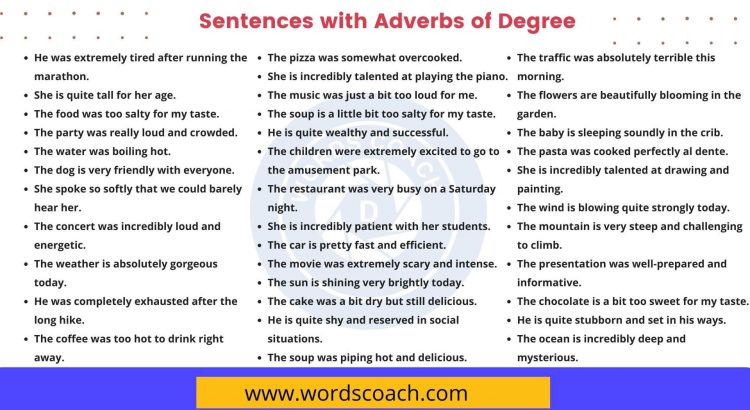
100+ Sentences with Adverbs of Degree in English
Here are 100+ sentences with Adverbs of Degree:
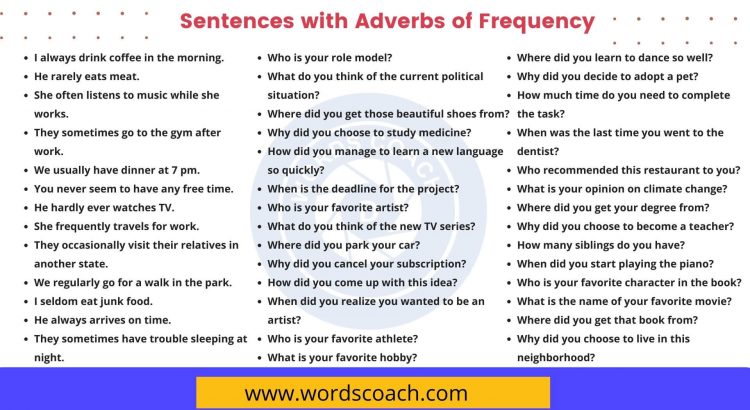
100+ Sentences with Adverbs of Frequency in English
Here are 100+ sentences with Adverbs of Frequency:

100+ Sentences with Interrogative Adverbs in English
Here are 100+ sentences with Interrogative Adverbs: Explore how to use interrogative adverbs in English with clear example sentences. Learn how these adverbs form questions about time, place, manner, and reason, enhancing your grammar skills.

100+ Sentences with Adverbs of Manner in English
100+ Sentences with Adverbs of Manner in English Learn how to use adverbs of manner in English with example sentences. Understand how these adverbs describe the way actions are performed and enhance your grammar skills.
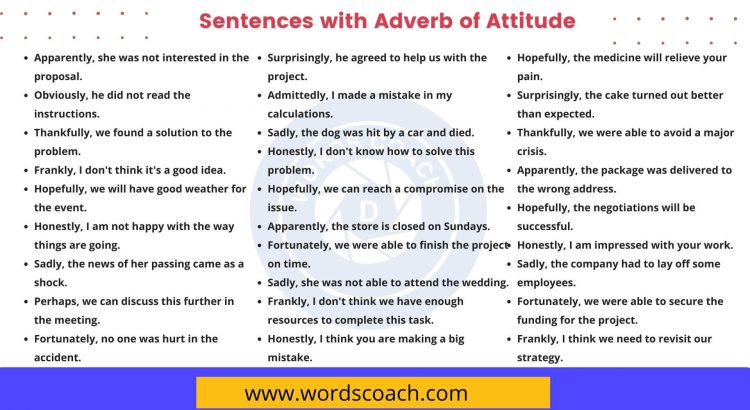
100+ Sentences with Adverb of Attitude in English
Discover 100+ sentences with adverbs of attitude in English. Learn how to express emotions, opinions, and viewpoints through adverbs of attitude with clear examples and grammar tips.

100+ Sentences with Adverbs of Affirmation in English
Explore 100+ sentences with adverbs of affirmation in English. Learn how to use these adverbs to express certainty and confidence, along with detailed examples to enhance your grammar skills.
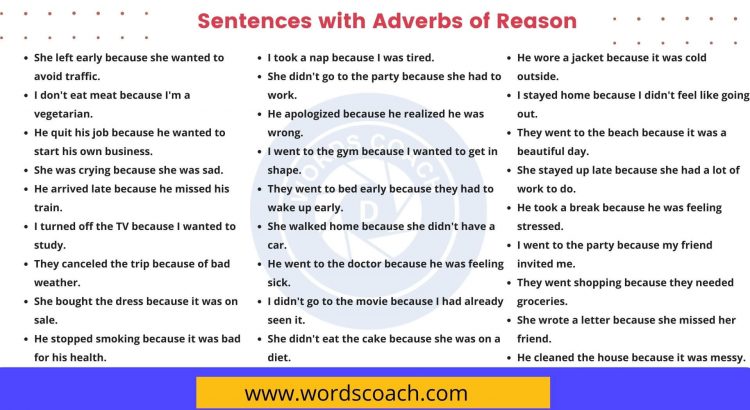
100+ Sentences with Adverb of Reason in English
100+ Sentences with Adverb of Reason in English. Learn how to use adverbs of reason in English with clear definitions and example sentences. Understand how these adverbs explain why actions happen and improve your grammar skills.
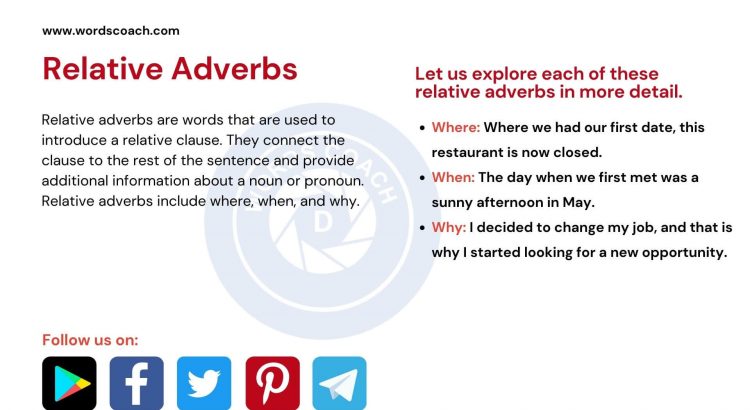
Relative Adverbs
Relative adverbs are an important part of the English language. They are words that are used to introduce a relative clause, which is a dependent clause that provides additional information about a noun or pronoun. Relative adverbs are used to connect the clause to the rest of the sentence and provide context and detail.
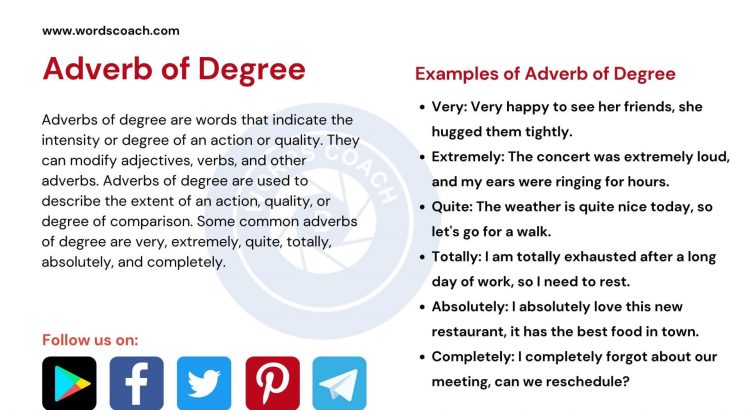
Adverb of Degree
Adverb of degree are words that indicate the intensity or degree of an action or quality. They can modify adjectives, verbs, and other adverbs. Adverbs of degree are used to describe the extent of an action, quality, or degree of comparison. Some common adverbs of degree are very, extremely, quite, totally, absolutely, and completely.
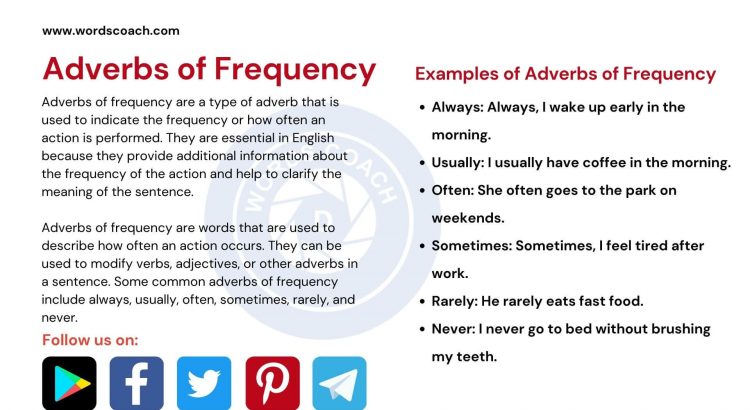
Adverbs of Frequency
Adverbs of frequency are words that are used to describe how often an action occurs. They can be used to modify verbs, adjectives, or other adverbs in a sentence. Some common adverbs of frequency include always, usually, often, sometimes, rarely, and never. Let us explore each of these adverbs in more detail.
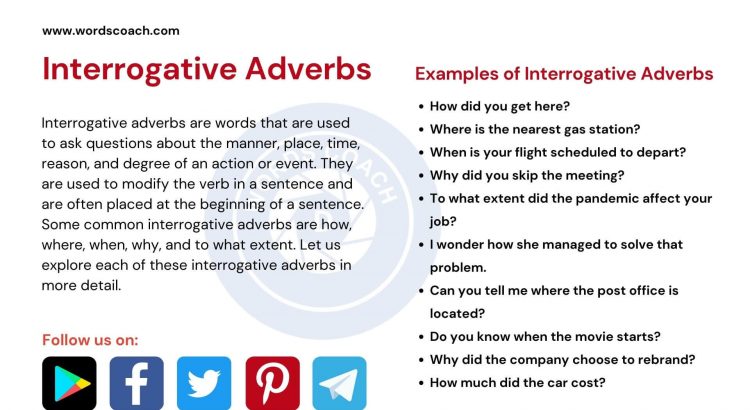
Interrogative Adverbs
Interrogative adverbs are words that are used to ask questions about the manner, place, time, reason, and degree of an action or event. They are used to modify the verb in a sentence and are often placed at the beginning of a sentence. Some common interrogative adverbs are how, where, when, why, and to what extent.
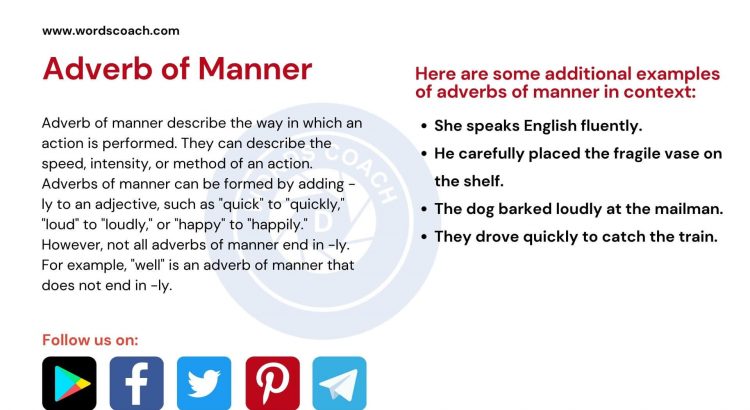
Adverb of Manner
Adverb of manner describe the way in which an action is performed. They can describe the speed, intensity, or method of an action. Adverbs of manner can be formed by adding -ly to an adjective, such as “quick” to “quickly,” “loud” to “loudly,” or “happy” to “happily.”
